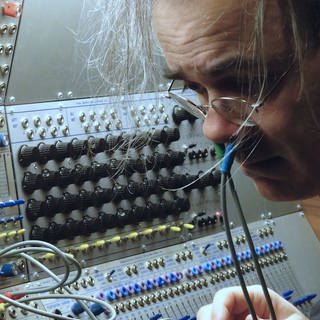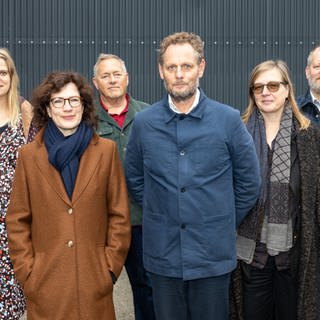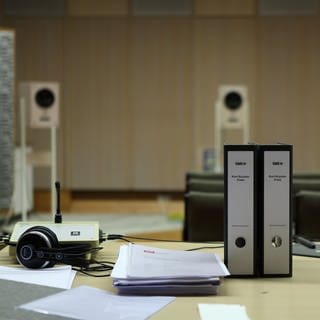Commentary on the work by Frédéric Aquaviva
I have long wanted to make a large-scale work based on work by my friend, the poet and artist Joël Hubaut. I asked Joël to perform some words that appear on drawings from his Epidemik Diary series. The recording took place in July 2019 at the Resident Studio in London. The titles of Joël's pictorial panels are spoken by American artist Dorothy Iannone, whose hypnotic voice I was able to record in her Berlin studio a few weeks earlier. The realization of the score and composition of ANTIPODES took place at the legendary EMS Studio in Stockholm and was completed in November 2019 in my own studio in London. The piece is based on my ten-year collaboration with Loré Lixenberg, which began with my project AATIE (2010-2011). ANTIPODES makes use of the magnificent vocal range of the British mezzo-soprano. Joël Hubaut contrasts her parts with his dark a nd powerful voice.
All of Joël Hubaut's visual works deal with the notion of virus and the concept of epidemic. The current Corona crisis was not their occasion.
ANTIPODES consists of three parts:
I. Hell / II. Purgatory / III. Paradise
Each part is in turn divided into six sections, analogous to the drawings that form the starting point of the work.
At the beginning I thought of composing much simpler than usual, following the motto "never repeat yourself ”. If I have succeeded in creating something new, it is through a composition that combines both simplicity and complexity. A strange complexity in which supposedly simple elements mutually reinforce each other, making ANTIPODES a kind of hell of a divine comedy.
ANTIPODES exists in different editions of works:
– as QR code record sleeve without record
– as serigraph with QR-codes on canvas (50x70cm)
– as a space-sound concert (first performances: CMMAS, Mexico and Experimental Intermedia, New York)
– as radiophonic diffusion
In April 2020 ANTIPODES had its premiere on the website studioconcreto.net. The piece ran as a loop for 24 hours.
It is a piece that has confronted all of us with our listening habits!
Competition 2020 and the jury's statement
This year, 69 entries from 25 countries were submitted. An independent jury chaired by Olaf Nicolai decided on the winners in Baden-Baden on Friday, July 10, 2020. Other jury members were Julia Cloot, Michael Grote, Thomas Meinecke and Julia Mihály.
"The Karl Sczuka Prize of the year 2020 goes to Frédéric Acquaviva (* 1967) for his polarizing audio piece "ANTIPODES for voices and dead electronics", a multi-layered work that draws its sonic inspiration from heterogeneous contexts of the classical avant-garde: the tradition of acoustic and visual arts, experimental music theater and literature (from Dante to Isidore Isou).
Artistic claims and the position of the author are undermined by collaging avant-garde purisms in pasticcio form and transforming them into a burlesque. On a musical level, this attitude is reflected in the polarity of the human voice and synthetically generated sounds. The jury sees his work as a provocative signal in the context of today's listening landscape. "
The 2020 award ceremony had to be postponed
The presentation of the Karl Sczuka Prize 2020 planned as part of the Donaueschingen Festival had to be canceled, as did the Donaueschingen Festival as a whole. The reason for this was the high number of coronavirus infections and the resulting legal restrictions. The award ceremony was postponed to 2021.
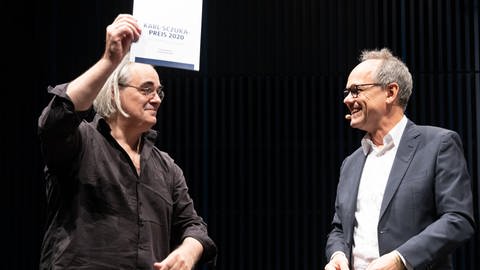
Award winner Frédéric Acquaviva
Frédéric Acquaviva, born near Paris in 1967, is a self-taught experimental composer and avant-garde sound artist who lives in Paris, Berlin and London. He works with voice, instruments, electronics, film and body sounds.
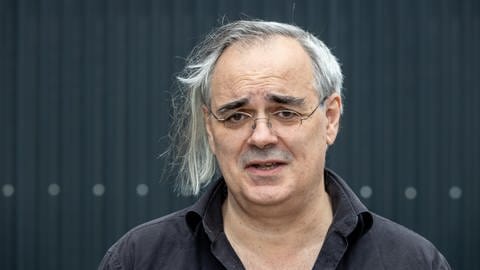
Acquaviva has been involved in the underground and experimental music scene since 1990. He has collaborated with important personalities of the historical avant-garde, including Isidor Isou, Marcel Hanoun, Pierre Guyotat, Bernard Heidsieck, Maurice Lemaître and Henri Chopin, as well as creatives of the more recent experimental scene such as poet-artists Jean-Luc Parant and Joël Hubaut, poet-filmmaker F. J. Ossang, the cellist Anton Lukoszewieze, the violinist Chihiro Ono, the trombonist Thierry Madiot, the pianist Mark Knoop and the mezzo-soprano Loré Lixenberg.
As the creator of "chronopolyphonic" installations, he has been working with the idea of the "oxymoron" since 1990. At the interface of instrumental and speech sounds, he uses computer processing and mixes it with physical body sounds. Some works include video texts or live streams.
His musical pieces must be considered from the compositional phase to the form of the final work, which was well demonstrated in subsequent exhibitions: In his retrospective sound exhibition "Frédéric Acquaviva, Music & Multiples Multiple Musics" at the project space "La Plaque Tournante" in Berlin (2017), in the first exhibition on his magazine "CRU" curated by Martha Willette Lewis at the Institute Library Gallery in New Haven, or in the comprehensive exhibition of his "CRU" issues at the Librarie-Galerie Lecointre et Drouet in Paris in 2018.
His work has been exhibited in concert halls and galleries such as the Palais de Tokyo and the Centre Pompidou in Paris, the Moderna Museet Stockholm, the Weserburg Museum in Bremen, the Turbine Hall at the Tate Modern in London, La Fenice in Venice, Fylkingen in Stockholm, Pauline Oliveros' Deep Listening Institute and Phill Niblock's Experimental Intermedia in New York, the Galerie Lara Vincy in Paris, the Galerie White Box in New York City, the Center for Contemporary Art Le Lieu in Québec, the Spor Festival in Aarhus, the Futura Festival in Crest, the Licences Festival in Paris, the ZKM in Karlsruhe, XP in Beijing, Hamburger Bahnhof and the Kantine im Berghain in Berlin and the Palazzo Bertalazzone in Turin.
He has furthermore created works for radio stations all over the world: France Culture, Radio Libertaire, BBC Radio3, Resonance FM, WGXC Radio New York, Deutschlandradio Kultur, RadioWebMacba, Radio Canada.
The music critic Franck Mallet wrote the essay: "Introducing Frédéric Acquaviva". Yoann Sarrat published a special issue of his magazine "Freeing (Our Bodies) # 2" on the music of Frédéric Acquaviva in the Parisian art magazine Art Press. It included contributions by Henri Chopin, Maurice Lemaître, Dorothy Iannone, ORLAN and Jacques Lizène , Jean-François Bory, Philip Corner, Bernard Heidsieck, Tom Johnson, Esther Ferrer.
Acquaviva was commissioned by the French Ministry of Culture in 1998, by ACR (France Culture) in 1999 and 2018, and by Motus / Palais de Tokyo in 2009. He has worked as a composer at the Emily Harvey Foundation in Venice (2009, 2011 and 2016) and at the EMS studios in Stockholm (2015 and 2019). Acquaviva also received the prestigious Beinecke Fellowship from Yale University in the USA (2012 and 2017). Since 2003, he has curated more than 40 exhibitions on avant-garde art and poetry (Gil J Wolman and Isidore Isou, among others) in museums such as the Barcelona Museum of Contemporary Art (MACBA), Serralves and the Museo Reina Sofia. In June 2019, Acquaviva's first monograph on Isidore Isou's artworks (Editions du Griffon) was awarded the FILAF prize for the best contemporary art book of the year.
Together with vocal artist and mezzo-soprano Loré Lixenberg, he founded the artist and experimental music space La Plaque Tournante in Berlin in 2014. This is fed by the AcquAvivA archive - an extensive collection of works by Lettrists and documents on experimental art from the mid-20th century to the present day. He also runs the CD-DVD website magazine CRU (represented in the collections of the Center Pompidou, Paris; MACBA, Barcelona; Fondazione Bonotto, Italy).
Acquaviva has also published more than 100 publications: in addition to his own musical works and multiples (published by Al Dante or Les Presses du Réel), numerous artist books on Lettrism, body and bio-art, sound art and composers (published by the labels Casus Belli, Editions AcquAvivA, £@B and B@£).
